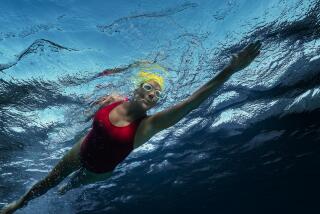Scuba Instructor Helps the Handicapped Dive Right In
- Share via
Jim Gatacre of San Clemente once dreamed about having a scuba-diving school where handicapped people--amputees, the blind and quadriplegics--could learn the joys of the sport.
“In the beginning, people weren’t accepting the idea and were saying that paraplegics can’t dive,” said Gatacre, who became handicapped in a freak accident.
He proved them wrong. In the past several years, his nonprofit diving school has certified more than 40 handicapped students and nearly 140 diving instructors in 14 states and nine countries.
Gatacre’s life changed one morning in 1972 when his right arm suddenly was paralyzed. After sleeping on it for 12 hours straight, he had damaged several nerve endings.
After the injury, he said, “I was trying to decide who I was. I felt physically unacceptable. Opening a can of soup was even hard for me. “
After 6 months of therapy, Gatacre, then a biology student, recovered about 60% of the use of his arm. To help overcome the mental strain, he took scuba-diving lessons and got his diving certification.
Soon after, in 1974, Gatacre came up with the idea of teaching scuba-diving as a fun and therapeutic sport for other handicapped people. That year, he and a UC Irvine professor organized a pilot project teaching diving to handicapped students. The project continued for 3 years.
In 1981, Gatacre decided to form his own school, the Handicapped Scuba Assn. Since then, he has taught scuba-diving to amputees, victims of paralysis and cerebral palsy, the blind and the mentally handicapped.
Although he has a full-time job as a salesman for a small roofing company, Gatacre now travels most weekends of the year teaching classes around the country and world. In October, Gatacre and his wife Patricia set up a one-room office in San Clemente, but they still find themselves working but still find themselves working most of their nights at home.
The classes provide scuba instructors with specialized medical knowledge to teach handicapped people to dive. The instructors also simulate various handicaps, from blindness to useless limbs.
For Julie Mora, 30, who has been in a wheelchair since youth due to a neurological disorder, Gatacre’s encouragement made the difference between success and failure.
Mora, of Santa Barbara, said she had a bad experience with another school unfamiliar with handicapped people.
“I kept flipping over and swimming upside down. It was real hard,” she said. But when Gatacre “saw me start turning to one side, they knew to make some adjustments and that I’d be OK.
“Jim said to me, ‘You’ll be able to do it, just give it time.’ And I thought, ‘Never.’ But after giving it some time I was able to swim on my own.”
John Cantrell of Eureka, who has had cerebral palsy since youth, also made frequent trips from his home to a swimming pool in San Juan Capistrano and the beaches in Laguna Beach to participate in Gatacre’s scuba-diving classes because he couldn’t find other instructors who were equipped to teach him. His wife, Julie, who is blind, also received instruction from Gatacre.
“Having Jim behind us was the only thing that helped us pull through all the classes,” said Julie Cantrell. “We spent so much money on phone bills (from Northern California) to get advice, support and coaching from him. . . . We couldn’t have done it without him.”
More to Read
Sign up for Essential California
The most important California stories and recommendations in your inbox every morning.
You may occasionally receive promotional content from the Los Angeles Times.













